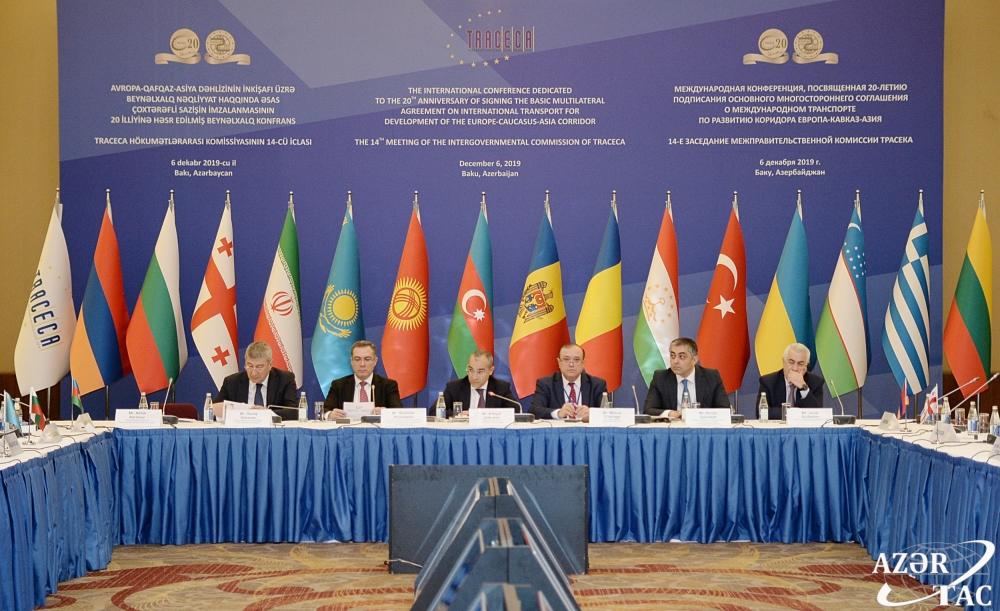Transport potential of Baku-Tbilisi-Kars to reach 15m tons

By Ofeliya Afandiyeva
The transport potential of the Baku-Tbilisi-Kars railway, a rail link project that was launched in 2017 to connect Azerbaijan, Georgia and Turkey, will reach 15 million tons in the future, Azerbaijan’s Economy Minister Mikayil Jabbarov has said.
The minister reminded that presently, six million tons of cargo and one million people are transported by Baku-Tbilisi-Kars.
Jabbarov made the remarks at the international conference dedicated to the 20th anniversary of the signing the Basic Multilateral Agreement on International Transport for Development of the Europe-Caucasus-Asia Transport Corridor and the 14th meeting of the Permanent Secretariat of the TRACECA Intergovernmental Commission on December 6 in Baku.
The minister spoke about Azerbaijan’s strategic importance for TRACECA as it is located at the crossroads of international transport corridors and large investments in the transport sector have enabled realization of the large-scale transport and infrastructure projects in the country.
He cited the implementation of Baku-Tbilisi-Kars railway project, construction of Baku International Sea Trade Port, development of international airports in Baku and districts, East-West and North-South transport corridors as factors strengthening Azerbaijan’s transport potential.
Noting the importance of cooperation within TRACECA, Jabbarov said that the implementation of the transport potential of the member countries would further increase the transit attractiveness of the region.
The Secretary General of TRASECA, Mircea Chiopraga, highlighted the importance of the conference in terms of expanding international economic cooperation, enhancing the region's development, developing national and regional transport structures, and learning from best practices and informed about on the large-scale projects in improvement of the corridor.
“In the past, about 50 percent of cargo transported by corridor fell to hydrocarbons. Within TRACECA, 85 projects in the worth of totally $206,7 millions were fulfilled. Generally, $4,4 billion were invested in the development of infrastructure within the construction of the corridor,” Chiopraga said.
The conference was attended by 13 member states of TRACECA and two observer states, more than 70 representatives of the international organizations and concluded its function with adoption of Baku Declaration.
TRACECA is a program of international cooperation between the EU and the partner countries in the creation of the Europe-Caucasus-Asia transport corridor.
The energy component of the TRACECA corridor is provided through the Baku-Tbilisi-Ceyhan and Baku-Supsa oil pipelines operating in the east-west direction, the Baku-Tbilisi-Erzurum gas pipeline, and the Southern Gas Corridor.
Trans-Caspian International Transport Route, Lapis-Lazuli, Caspian Sea-Black Sea international transport routes increase the competitiveness potential of TRACECA countries as a transit region.
TRACECA program was established in 1993 on the basis of the Brussels Declaration with the participation of Azerbaijan, Armenia, Georgia, Kazakhstan, Kyrgyzstan, Tajikistan, Turkmenistan and Uzbekistan.
In September 1998, at the historic Summit in Baku 12 TRACECA countries signed the “Basic Multilateral Agreement on International Transport for Development of the Europe-the Caucasus-Asia Corridor” (MLA) with the aim of implementing their geopolitical and economic potentials.
Moldova, Mongolia and Ukraine joined the program later. Turkey, Romania and Bulgaria in 2000, Iran in 2009.
--
Follow us on Twitter @AzerNewsAz
Here we are to serve you with news right now. It does not cost much, but worth your attention.
Choose to support open, independent, quality journalism and subscribe on a monthly basis.
By subscribing to our online newspaper, you can have full digital access to all news, analysis, and much more.
You can also follow AzerNEWS on Twitter @AzerNewsAz or Facebook @AzerNewsNewspaper
Thank you!
